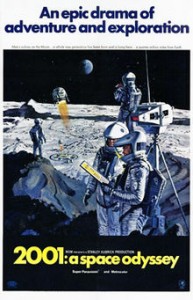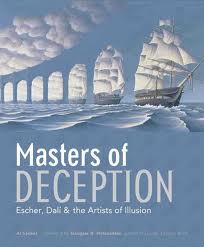I have four sons, in two sets – 23, 20 and 13, 11. One cool benefit of this “arrangement” is that I can re-watch movies I like for reasons other than I just want to: Hey! They haven’t seen Tron, let’s watch that! (of course they have, that’s just a for instance.) Some are movies my wife and I both like, some are movies that only I like (Goonies is a good example.) Some will still have to wait – Terminator, Conan, Die Hard, etc. – we believe most of the ratings are for good reason. But I can wait.
Last night I introduced my younger two to “2001: A Space Odyssey”.  It’s still a great movie after 42 years. I was not surprised when my youngest said he didn’t understand it. I explained about the (SPOILER ALERT! In case someone hasn’t seen it and may want to someday, skip to the next paragraph) extraterrestrial influence nudging evolution and then about the TMA-1 monolith signaling humankind’s advancement to sufficient level to discover the monolith on the moon.
In a rare moment of parental thoughtfulness, I refrained from commenting on the third and fourth segments. You see, I happen to think that all of the interpretation and analysis of the ending are a bunch of hogwash. Kubrick was deliberate in his tedious treatment of what I thought was a very thin script, plodding without dialogue, enhancing the pre-Vader breathing of Bowman, flashing pretty colors with the intent to impress a much greater than human intellect and meaning at work.
(Ooops. Forgot to alert. Not really)
Flashback: in the sixth grade, my class read “Jonathan Livingston Seagull”
It’s still a great movie after 42 years. I was not surprised when my youngest said he didn’t understand it. I explained about the (SPOILER ALERT! In case someone hasn’t seen it and may want to someday, skip to the next paragraph) extraterrestrial influence nudging evolution and then about the TMA-1 monolith signaling humankind’s advancement to sufficient level to discover the monolith on the moon.
In a rare moment of parental thoughtfulness, I refrained from commenting on the third and fourth segments. You see, I happen to think that all of the interpretation and analysis of the ending are a bunch of hogwash. Kubrick was deliberate in his tedious treatment of what I thought was a very thin script, plodding without dialogue, enhancing the pre-Vader breathing of Bowman, flashing pretty colors with the intent to impress a much greater than human intellect and meaning at work.
(Ooops. Forgot to alert. Not really)
Flashback: in the sixth grade, my class read “Jonathan Livingston Seagull”  and we discussed as a group the “meaning” of the book. I put that last word in quotes, because as you might guess, I found no meaning. My first out loud responses to the thoughts being bandied were along the lines, “Where does he [author Richard Bach] say that?” But I got squashed by the group and the teacher, and kept quiet after that. I started thinking something was wrong with me for not being able to “see” the “meaning” behind the work.
Some years later, I came to the conclusion that it wasn’t me; they were the ones making up that crap about positive thinking and human potential. It really was just a simple, very simple children’s story with no deeper meaning. (I bought a copy last year on the Half Price Books $1 shelf just to see if I had changed. Still not impressed.)
Several many years later, I came to the conclusion that it was both me and them. Well....me. I can't be sure about them.
My wife is an artist. And she understands people. I understand people from a perspective of leadership and that works well in my life. She really understands people. (Good thing she’s the mother of my children, because if it were just me, they’d be emotional lepers!) We’d get into “discussions” over books and films on what the director (or author) was trying to convey. I, in my obstinate cynicism, used to dismiss with prejudice what she had to say, because after all, they are telling a story, not expounding a deep philosophical commentary on the human condition, because that’s a load of hokum anyway. Yeah. I couldn’t be more wrong, right? Besides, just because I dismissed it didn’t mean she dismissed it. Anyway, there have been more than one occasions where I might have had negative comments on films. I usually learn a lot during the subsequent analysis. Andrea has told me in many certain terms, “here, the director was trying to …” Once, I rented the DVD and played the director’s commentary. At all the scenes she pointed out in our earlier discussion, the director said something like, “in this scene, I was trying to …” … same as what she said.
It's like a magic trick. I stopped trying to figure it out. But she’s usually right. And that applies to art and sculpture as well as film and print. I just don’t get it. I don’t see why Jane Austen is a great author. Hemingway? Fitzgerald or Faulkner? Nope. Not buying it. Oh, they did things I don’t do – write, get published, etc. But how are they any better than Stephen King (not a fan, by the way)? I also feel that if something can't stand on face value without apologetics, then it shouldn't be lauded. How is one interpretation more right than another? Yeah. I know. Different discussion altogether. But with film, print and art, it's me. Sans interpretation gene.
Now, given that my sons are mostly artistic, I think that understanding people the way Mom does is more valuable than the way I do, because what I do can be taught (even though some people come by it naturally) at any time. I think that much like learning other languages, if the appropriate synapses are not used early enough, then they atrophy and that makes learning those skills that much harder later, if possible at all. I think some synapses are more like stem synapses (I'll take credit for coining that phrase if it hasn't been used yet) in that they can serve any function. And some are specialized. Just a theory. Not a scientific theory, but more of a Holmesian theory. So my sons need to understand how authors and artists may (or may not) have intended meanings beneath the superficial. I think they've got the gene that I don't.
And back to “2001”. I found a few sites - here, here, and here, and an interesting flash presentation at Kubrick2001.com that offer explanations and I’m showing them to my son so that he might understand. This one talks about a scene near the end of part III (before HAL: "What are you doing, Dave?") as "one of the most exciting, suspenseful sequences in all of movie history." See, I don't get that. I like the movie for the science and technological vision in the context of 1968. But, I’m given to understand that there might be more to it than that. Apparently.
So here are two questions for the home audience:
1) Anybody else out there sort of like me? Don’t usually see much alternative meaning in {art, film, literature} where other people do? Don’t be shy. Oh, that is not to say we don’t appreciate art, movies, literature; just that the “meaning” is not apparent. Gee. Kind of quiet here in Kubrick's space...
2) If you’ve seen the movie, what are your thoughts on it? I’ll pass on to my son, so that he can see what other people think, and maybe I’ll learn something too.
and we discussed as a group the “meaning” of the book. I put that last word in quotes, because as you might guess, I found no meaning. My first out loud responses to the thoughts being bandied were along the lines, “Where does he [author Richard Bach] say that?” But I got squashed by the group and the teacher, and kept quiet after that. I started thinking something was wrong with me for not being able to “see” the “meaning” behind the work.
Some years later, I came to the conclusion that it wasn’t me; they were the ones making up that crap about positive thinking and human potential. It really was just a simple, very simple children’s story with no deeper meaning. (I bought a copy last year on the Half Price Books $1 shelf just to see if I had changed. Still not impressed.)
Several many years later, I came to the conclusion that it was both me and them. Well....me. I can't be sure about them.
My wife is an artist. And she understands people. I understand people from a perspective of leadership and that works well in my life. She really understands people. (Good thing she’s the mother of my children, because if it were just me, they’d be emotional lepers!) We’d get into “discussions” over books and films on what the director (or author) was trying to convey. I, in my obstinate cynicism, used to dismiss with prejudice what she had to say, because after all, they are telling a story, not expounding a deep philosophical commentary on the human condition, because that’s a load of hokum anyway. Yeah. I couldn’t be more wrong, right? Besides, just because I dismissed it didn’t mean she dismissed it. Anyway, there have been more than one occasions where I might have had negative comments on films. I usually learn a lot during the subsequent analysis. Andrea has told me in many certain terms, “here, the director was trying to …” Once, I rented the DVD and played the director’s commentary. At all the scenes she pointed out in our earlier discussion, the director said something like, “in this scene, I was trying to …” … same as what she said.
It's like a magic trick. I stopped trying to figure it out. But she’s usually right. And that applies to art and sculpture as well as film and print. I just don’t get it. I don’t see why Jane Austen is a great author. Hemingway? Fitzgerald or Faulkner? Nope. Not buying it. Oh, they did things I don’t do – write, get published, etc. But how are they any better than Stephen King (not a fan, by the way)? I also feel that if something can't stand on face value without apologetics, then it shouldn't be lauded. How is one interpretation more right than another? Yeah. I know. Different discussion altogether. But with film, print and art, it's me. Sans interpretation gene.
Now, given that my sons are mostly artistic, I think that understanding people the way Mom does is more valuable than the way I do, because what I do can be taught (even though some people come by it naturally) at any time. I think that much like learning other languages, if the appropriate synapses are not used early enough, then they atrophy and that makes learning those skills that much harder later, if possible at all. I think some synapses are more like stem synapses (I'll take credit for coining that phrase if it hasn't been used yet) in that they can serve any function. And some are specialized. Just a theory. Not a scientific theory, but more of a Holmesian theory. So my sons need to understand how authors and artists may (or may not) have intended meanings beneath the superficial. I think they've got the gene that I don't.
And back to “2001”. I found a few sites - here, here, and here, and an interesting flash presentation at Kubrick2001.com that offer explanations and I’m showing them to my son so that he might understand. This one talks about a scene near the end of part III (before HAL: "What are you doing, Dave?") as "one of the most exciting, suspenseful sequences in all of movie history." See, I don't get that. I like the movie for the science and technological vision in the context of 1968. But, I’m given to understand that there might be more to it than that. Apparently.
So here are two questions for the home audience:
1) Anybody else out there sort of like me? Don’t usually see much alternative meaning in {art, film, literature} where other people do? Don’t be shy. Oh, that is not to say we don’t appreciate art, movies, literature; just that the “meaning” is not apparent. Gee. Kind of quiet here in Kubrick's space...
2) If you’ve seen the movie, what are your thoughts on it? I’ll pass on to my son, so that he can see what other people think, and maybe I’ll learn something too.









